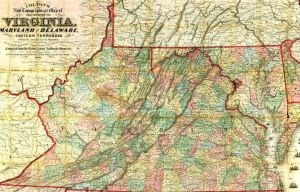 Union Gen. Benjamin F. Butler of Massachusetts is commander of the Department of Virginia and North Carolina. Butler is hated among white Southerners for his distinction of authoring the designation of fugitive slaves in Union controlled-territory as “contraband,” an order he had issued in May 1861 while commanding the Department of Eastern Virginia. While prior to the war and while serving as a U.S. congressman and senator, Butler had consistently voted in favor of slavery. Ironically, his 1861 decision paved the way for Lincoln‘s Emancipation Proclamation of January 1, 1863.
Union Gen. Benjamin F. Butler of Massachusetts is commander of the Department of Virginia and North Carolina. Butler is hated among white Southerners for his distinction of authoring the designation of fugitive slaves in Union controlled-territory as “contraband,” an order he had issued in May 1861 while commanding the Department of Eastern Virginia. While prior to the war and while serving as a U.S. congressman and senator, Butler had consistently voted in favor of slavery. Ironically, his 1861 decision paved the way for Lincoln‘s Emancipation Proclamation of January 1, 1863.
This month “the Beast” (as he is known among white Southerners) is busy confiscating the property of Confederate citizens in Union-controlled Norfolk, Virginia.
Today’s Richmond Daily Dispatch reports on these latest of atrocities by Butler, the brief article dripping with sarcasm:
The humane Butler, who is so solicitous about the health of the Yankee prisoners in Richmond, has commenced confiscating the property of citizens in Norfolk. The real estate, furniture, goods, chattels, and personal property of the following persons is advertised for sale for the benefit of the U. S. Government: Wm. W. Davis, C. W. Murdaugh, member of the Legislature; Jos. M. Miles, clothing merchant; Rev. Thos. Hume, Baptist minister; Ed. Kearns, a captain in the Confederate service; Thos. W. Cofer, John T. Rustic, naval constructor at Selma’ Ala; W. C. Wingfield, C. W. Young, Robert V. Boykin, John De Bree, Chas. T. Myers, W. M. Mahone, Mathias Ward, and Terry Sinclair.
Among the names is that of Confederate Baptist chaplain Rev. Thomas Hume (1836-1912). A Portsmouth native and the son of a Baptist minister, Hume is a graduate of a Baptist school, Richmond College, after which he had served as a professor of English and Literature at Chesapeake Female College prior to the war. Having enlisted in the Confederate Army shortly after hostilities broke out, he served as chaplain of the 3rd Regiment, Virginia Infantry until transferred to the post chaplaincy of Petersburg, Virginia, his current position. Hume remains in Petersburg as the chaplain of the town’s Confederate hospitals throughout the remainder of the war.
Despite the confiscation of his property this month, Hume survives the war, marries Annie Louise Whitescarver, becomes the father of four children, prospers and and makes a name for himself in the field of higher education.
Appointed as principle of the Petersburg Classical Institute soon after the war, his later, notable accomplishments include: the presidency of Danville College, Virginia; the pastorates of Danville Baptist Church, Cumberland Baptist Church in Norfolk, and the first Baptist Church in Norfolk; a stint as professor of English and Latin at Norfolk College and of English and Literature at the University of North Carolina; a national leadership role with the Young Men’s Christian Association (YMCA); president of the North Carolina Baptist Historical Society; and in 1907 the first North Carolina recipient of a Carnegie Foundation Advancement of Teaching annuity. Upon his retirement Hume devotes the remainder of his active years to research. His death in 1912 brings an end to a remarkable post-war career.
Sources: “General Benjamin Franklin Butler,” University of Cincinnati Libraries (link); “Confiscation of Property in Norfolk,” Richmond Daily Dispatch, January 26, 1864 (link); Thomas Hume Papers, 1777-1913, University of North Carolina (link); “Hume, Rev. Thomas Jr.,” in William Cathcart, The Baptist Encyclopedia, Vol. 2, Philadelphia: Louis H. Everts, 1883, pp. 558 (link)


